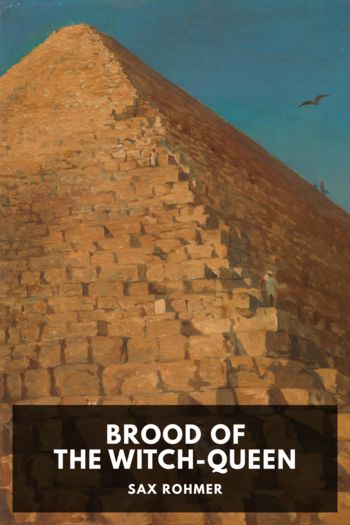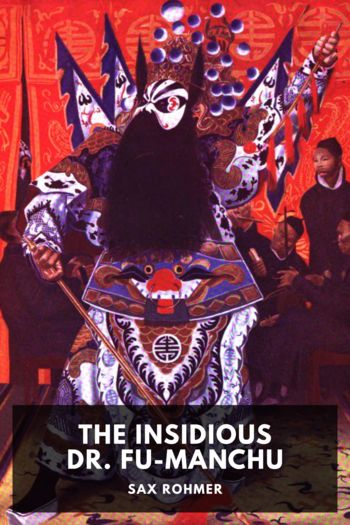Brood of the Witch-Queen - Sax Rohmer (icecream ebook reader .txt) 📗

- Author: Sax Rohmer
Book online «Brood of the Witch-Queen - Sax Rohmer (icecream ebook reader .txt) 📗». Author Sax Rohmer
“My dear fellow!” Ferrara rose. “I have a wine which, I declare, you will never have tasted but which you will pronounce to be nectar. It is made in Cyprus—”
Cairn raised his hand in a way that might have reminded a nice observer of his father.
“Thank you, nevertheless. Some other time, Ferrara; I am no wine man.”
“A whisky and soda, or a burly British B. and S., even a sporty ‘Scotch and Polly’?”
There was a suggestion of laughter in the husky voice, now, of a sort of contemptuous banter. But Cairn stolidly shook his head and forced a smile.
“Many thanks; but it’s too early.”
He stood up and began to walk about the room, inspecting the numberless oddities which it contained. The photographs he examined with supercilious curiosity. Then, passing to a huge cabinet, he began to peer in at the rows of amulets, statuettes and other, unclassifiable, objects with which it was laden. Ferrara’s voice came.
“That head of a priestess on the left, Cairn, is of great interest. The brain had not been removed, and quite a colony of Dermestes Beetles had propagated in the cavity. Those creatures never saw the light, Cairn. Yet I assure you that they had eyes. I have nearly forty of them in the small glass case on the table there. You might like to examine them.”
Cairn shuddered, but felt impelled to turn and look at these gruesome relics. In a square, glass case he saw the creatures. They lay in rows on a bed of moss; one might almost have supposed that unclean life yet survived in the little black insects. They were an unfamiliar species to Cairn, being covered with unusually long, black hair, except upon the root of the wing-cases where they were of brilliant orange.
“The perfect pupae of this insect are extremely rare,” added Ferrara informatively.
“Indeed?” replied Cairn.
He found something physically revolting in that group of beetles whose history had begun and ended in the skull of a mummy.
“Filthy things!” he said. “Why do you keep them?”
Ferrara shrugged his shoulders.
“Who knows?” he answered enigmatically. “They might prove useful, some day.”
A bell rang; and from Ferrara’s attitude it occurred to Cairn that he was expecting a visitor.
“I must be off,” he said accordingly.
And indeed he was conscious of a craving for the cool and comparatively clean air of Piccadilly. He knew something of the great evil which dwelt within this man whom he was compelled, by singular circumstances, to tolerate. But the duty began to irk.
“If you must,” was the reply. “Of course, your press work no doubt is very exacting.”
The note of badinage was discernible again, but Cairn passed out into the mandarah without replying, where the fountain plashed coolly and the silver mibkharah sent up its pencils of vapour. The outer door was opened by the Oriental servant, and Ferrara stood and bowed to his departing visitor. He did not proffer his hand.
“Until our next meeting. Cairn, es-selâm aleykûm!” (peace be with you) he murmured, “as the Muslims say. But indeed I shall be with you in spirit, dear Cairn.”
There was something in the tone wherein he spoke those last words that brought Cairn up short. He turned, but the doors closed silently. A faint breath of ambergris was borne to his nostrils.
V The Rustling ShadowsCairn stepped out of the lift, crossed the hall, and was about to walk out on to Piccadilly, when he stopped, staring hard at a taxicab which had slowed down upon the opposite side whilst the driver awaited a suitable opportunity to pull across.
The occupant of the cab was invisible now, but a moment before Cairn had had a glimpse of her as she glanced out, apparently towards the very doorway in which he stood. Perhaps his imagination was playing him tricks. He stood and waited, until at last the cab drew up within a few yards of him.
Myra Duquesne got out.
Having paid the cabman, she crossed the pavement and entered the hallway. Cairn stepped forward so that she almost ran into his arms.
“Mr. Cairn!” she cried. “Why! have you been to see Antony?”
“I have,” he replied, and paused, at a loss for words.
It had suddenly occurred to him that Antony Ferrara and Myra Duquesne had known one another from childhood; that the girl probably regarded Ferrara in the light of a brother.
“There are so many things I want to talk to him about,” she said. “He seems to know everything, and I am afraid I know very little.”
Cairn noted with dismay the shadows under her eyes—the grey eyes that he would have wished to see ever full of light and laughter. She was pale, too, or seemed unusually so in her black dress; but the tragic death of her guardian, Sir Michael Ferrara, had been a dreadful blow to this convent-bred girl who had no other kin in the world. A longing swept into Cairn’s heart and set it ablaze; a longing to take all her sorrows, all her cares, upon his own broad shoulders, to take her and hold her, shielded from whatever of trouble or menace the future might bring.
“Have you seen his rooms here?” he asked, trying to speak casually; but his soul was up in arms against the bare idea of this girl’s entering that perfumed place where abominable and vile things were, and none of them so vile as the man she trusted, whom she counted a brother.
“Not yet,” she answered, with a sort of childish glee momentarily lighting her eyes. “Are they very splendid?”
“Very,” he answered her, grimly.
“Can’t you come in with me for awhile? Only just a little while, then you can come home to lunch—you and Antony.” Her eyes sparkled now. “Oh, do say yes!”
Knowing what he did know of the man upstairs, he longed to accompany her; yet, contradictorily, knowing what he did he could not face him again, could not submit himself to the test of





Comments (0)